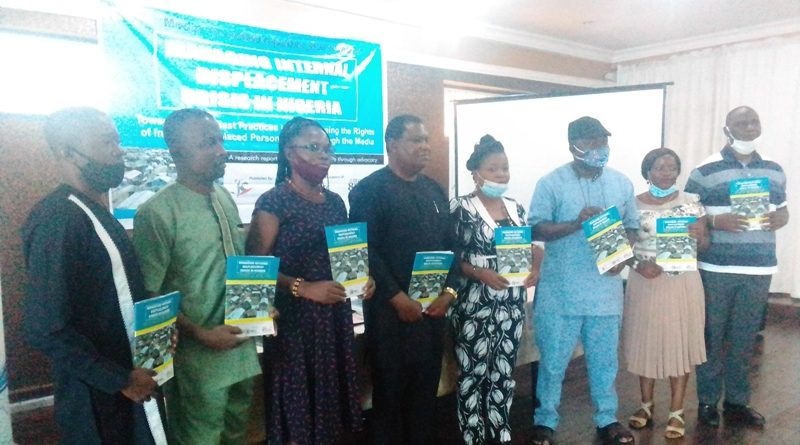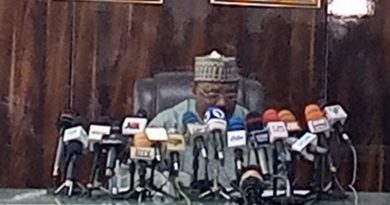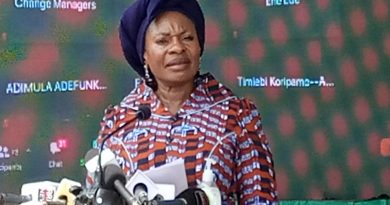IDP CRISIS IN NIGERIA: JFC Presents Report
Oru Leonard
Journalists for Christ (JFC), with the support of World Association for Christian Communication (WACC), Waldensian Churchs Otto Per Mille (OPM), Italy and other stakeholders involved in alleviating the problems of Internally Displaced Persons (IPCs), in Nigeria on Thursday, August 20 presented a report titled ‘Managing Internal Displacement Crisis In Nigeria’.
The report is a follow up of an earlier project titled “Monitoring Media Reportage and Portrayal of Internally Displaced Persons; Case studies of Nigeria, Demographic Republic of Congo and Kenya implemented in 2018/2019.”
The 44-page report captures the findings of a study on internal displacement in Nigeria with the goal to develop an advocacy resource and document global best practices towards guaranteeing the rights of Internally Displaced Persons (IDPs). The report is also expected to serve as an advocacy document to galvanize broader stakeholders’ involvement in advancing the welfare of IDPs and refugees in Nigeria.
In his opening remarks the Founding President of Journalists for Christ, Mr Lekan Otufodunrin who was represented by a board member of JFC and publisher of Church Times, Mr Gbenga Oshinaike, said reports of the previous project on monitoring of media reportage revealed that the issue of internal displacement is no longer what we can take with a pinch of salt. He recalled that the Executive Director Centre for Childrens Health Education Orientation and Protection (CEE-HOPE), Betty Abah who was at the review noted that some of the IDPs are professionals, people of means and people who never expected that they would lose their homes.
“Unfortunately, when they are displaced they are subjected to all kinds of inhuman and demeaning treatment. Children are not given adequate attention. When people go to visit the IDP camps, nobody thinks of the girl child. It is amazing that those who support those in the IDP camps dont even think of sanitary pads for the young girls and women in those camps. The living condition in the camps is appalling.
“Assistant Chief Admin-Officer of the National Commission for Refugees, Migrants and Internally Displaced Persons (NCFRMI), Mrs. Ola Erinfolami also made us realize that even in Lagos there are about 10,000 displaced persons including returnees from Libya”, he said.
He noted that with the 2018 findings the JFC approached WACC and Waldensian Churchs Otto Per Mille (OPM), Italy on the need to do a follow-up on how to properly manage internal displacement crisis in Nigeria, of which the supported.
“We have been able to put together a report on how to manage internal displacement crisis in Nigeria. We are here today to brainstorm on the outcome of the presentation and create a working template for officials that are directly concerned with the issues of IDPs in Nigeria and also sensitize the media the more on how they can help in projecting IDP issues to the public.
“We want to specifically thank our sponsors as mentioned earlier. We would not have been able to carry out the project if they have not graciously supported us. We pray that the Lord will continue to bless them. But if there was financial support and there are no competent hands to carry out the project, we wont be sitting here today. That is why we are specifically grateful to Dr. Sarah Macharia of WACC global for the useful insight she brought to bear in the course of the project.
The President commended Mr. Francis Abayomi, Executive Director, Peace and Development Project who was the lead researcher Mr. Sanmi Falobi, Programme Manager, International Press Centre who provided technical assistance in the structuring and guidance on the implementation of key components of the project, for doing a great job on the report.
He further noted that the JFC team of Dayo Emmanuel and Oyinlola Awonuga played critical roles in ensuring the birth of this baby.
“It is hoped that as we discuss today and share perspectives, we will help to push the frontiers of awareness on internally displaced persons in Nigeria and by extension help bring an end to the challenges facing this critical aspect of our life in Nigeria”, the President concluded.
Giving a brief overview of the research methodology/process of documentation, the Research Consultant, Francis Abayomi, said that the role of Journalists in managing IDPs is very key, because if they do not report what is going on in the camps, the government might not appreciate the depth of the crisis IDPs are going through in Nigeria, and know how best to channel resources to address their needs
He further stated that the study was informed by Development Communication Theory of the Media as well as the Social Responsibility Theory which both emphasizes the essence of pursuing national interest in driving the process of change through news reporting, adding that the study, within the context of both theories explored a wide-range of issues pertaining to crisis of internal displacement in Nigeria, underlying factors predisposing forced displacement, dilemma of lingering conflicts and insecurity, lack of robust institutions and structures for emergency response and so on.
He noted that the study also points to the possibility of worsening humanitarian crisis in future, if the menace of violent conflicts and proliferation of small arms and light weapons are not addressed, and global best practices in relation to international instruments of the United Nations (UN) as well as regional treaties are not explored.
Abayomi, noted that one critical conclusion that emerged from the study relates to the need for strengthened legislative and institutional frameworks with commitment to enforcing global best practices in line with international standards, to ensure greater sense of responsibility and accountability amongst actors concerned with the management of IDPs in Nigeria.
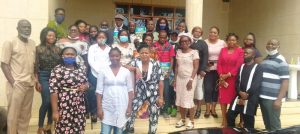
Also speaking Sanmi Falobi, JFC Project Advisor, said that the destruction of lives has removed people from their homes into camps, making them internally displaced, their rights to exist truncated, most of their dreams shattered and they are traumatized as they are in war zones.
He added that most of them do not have a voice, and so, the meeting will help stakeholders give voice to such people, to ensure that where they live presently have basic life amenities such as food, water, and healthcare.
Sanmi who also noted that mismanagement of funds is another challenge IDPs are facing, revealed that the law enforcement agencies that are supposed to protect them also molest them, as reports of some of them accusing the soldiers that are supposed to protect them of rape have emanated. He urged the media to focus on such issues to see how there can be effective legislation on IDPs especially on managing the crisis in Nigeria.
Reviewing the report, Mr Theophilus Abah, Director, Daily Trust Foundation, lamented that Journalists are not passionate about changing the conditions around them, as they no longer see the need to report the IDPs because beat coverage is emphasized and the conditions of IDPs are now commonplace, arguing that Journalism should be about making impact not money.
He stated that fom the report, Journalists have failed in protecting the interests of IDPs, and also, soldiers abuse the rights of the IDPs by using them as help to farm on their land, thereby violating the rights of the victims.
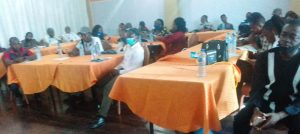
Abah who said the research showed that lack of data, poor reportage on IDPs is due to lack of a clear legislative framework, suggested that it is necessary in order to provide better understanding and encourage media reportage and intervention that focus on issues relating to safety and welfare of IDP camps.
“Who do you talk to, what right do you have to interview them? He asked. “Without provision of Justice, IDP camps are like jungles. There is a need for the media to engage in advocacy that will influence government policies and improve the living conditions of the IDPs, advocacy could facilitate legislative framework which can guarantee better Journalism.”
In her contribution, the Executive Director, CEE HOPE, Betty Abah, advised Journalists to work with empathy and passion; Handle IDPs with utmost care; Report with a sense that it’s for public good and the reporting could change a life; Ensure that they are vast in what they do; Have knowledge of the international treatise; Be very professional by seeking permission before publishing people’s pictures; Be conscious of their own healthcare; and Seek for help when traumatised on the activities.
Abah, who noted that the treatment of IDPs in Nigeria is unfair and scandalous, questioned the rationale behind the Government rehabilitating terrorists while having no regards for IDPs.
She said tackling gender issues in IDP camps is important, as there is a prevalence of serious period poverty in Nigeria, noting that menstruation is undertermined in Nigeria.
Also in the roundtable discussion were a development journalist, Ene Osang, NUJ Abuja Chairman, Emmanuel Ogbeche who was represented by his vice, Mr. Osadebamwen Patrick.
Other sponsors of the event are Mrs. Erinfolanmi Ola of the National Commission for Refugees Migration & IDPs, (Southwest Zone); Dr. Oloruntola Sunday of the Department of Mass Communication, University of Lagos; Miss Amaka Okoye of Plus TV Africa; Mr. John Okocha, documentary journalist and filmmaker; Bilkisu Irama of PAGED (Participatory Communication for Gender Development) Initiative, Abuja, Mrs. Funmi Falobi, development journalist and editor, Social Development News (SDN); Mr. Adeola Ogunlade, a journalist at The Nation Newspaper; Mr. Gbenga Osinaike, publisher Church Times Nigeria, including online contribution from Jesse Tafida of Television Continental, Maiduguri, Nigeria for their contribution to the project.

